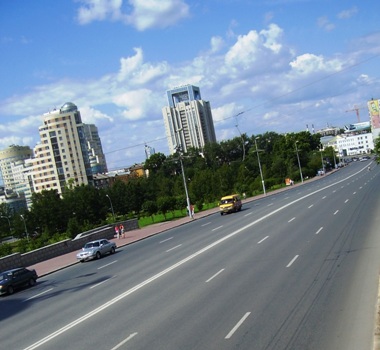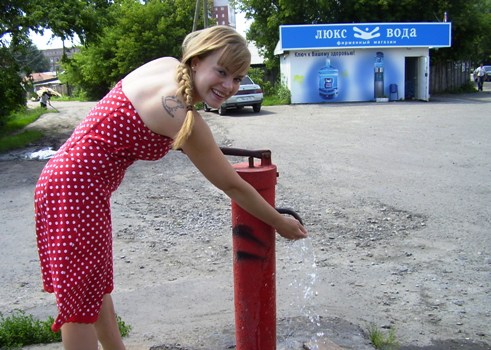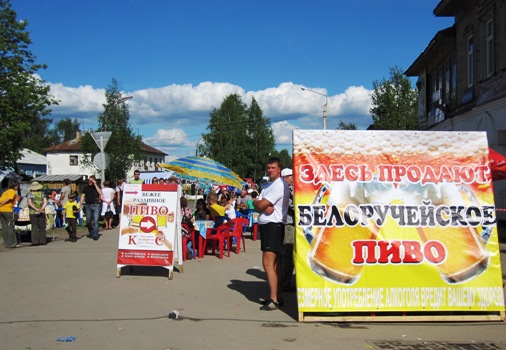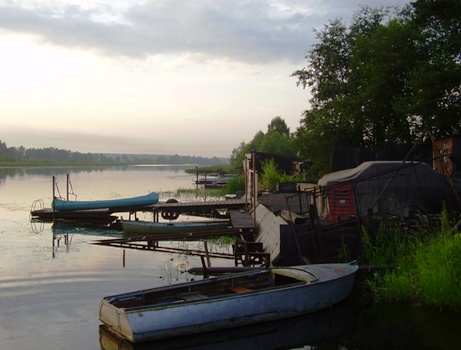Word of the Week: «Жара!» [Heat!] Posted by josefina on Jul 18, 2010 in language, News, Russian for beginners, Russian life, when in Russia
In Russia you’ll only find «такая пустая улица» [such an empty street] in the city «летом» [(instrumental case: when?) in the summer] when «жара» [the heat] has driven all citizens either «на дачу» [(accusative case: direction) to the dacha] or – as one can read about in this article – «в подвал» [into the basement] in search of «тень» [fem. shade] and «прохладу» [(accusative case: object) cool; coolness].
Anyone who has been keeping an eye on the Russian news lately can’t possible have missed the heat wave that has almost paralyzed everyone «в европейской части Российской федерации» [in the European part of the Russian Federation]. Temperatures between 30 and 40 degrees Celsius in the summer are nothing out of the ordinary in places like the Urals or Siberia, but those Russian regions have a «резко континентальный климат» [drastic continental climate] that is indeed much more «резкий» [adj. abrupt, harsh, drastic] than the simply «континентальный климат» [continental climate] in other parts of the country we all love. If you google the phrase «жара в России» [heat in Russia] now you’ll find articles with titles like «В Москве от жары начали гибнуть аквариумные рыбки» [“In Moscow aquarium fishes have begun to die from the heat”], «Москва превратилась в асфальтную сковородку» [“Moscow has turned into a frying pan made out of asphalt”] and «Температурный рекорд в Москве вновь может быть побит» [“The temperature record in Moscow may be beat once again”]. The summer of 2010 is most likely going to be «самое жаркое лето» [the hottest summer] since the 1930’s – maybe the hottest summer EVER in Russia. This is of course a good reason to add a very useful word to our constantly expanding Russian «словарный запас» [vocabulary]: «жара» [heat]. This word is a feminine noun that has a couple of ‘word friends’ closely linked to it, like the adjective «жаркий» [1. hot; 2. fig. heated, passionate, intense], the adverb «жарко» [(used predicatively) hot] and the verb «жарить» [impfv., 1. to fry, roast, broil; 2. colloq. (of the sun) to beat down (on)]. There’s also the masculine noun «жар» [1. heat; 2. fever, high temperature; 3. fig. ardor, fervor] used in the expression «в жару» [running a high fever], and not to be entirely confused with our word of the week «жара» [heat].
Don’t forget to drink «много воды» [a lot of water] when it’s «жарко» [hot]! In Russia you can either spend money on bottled «люкс вода» [‘luxury water’] – as seen in the background on this photo – or do as the natives and get it fresh for free from a pump in the street. I think it is rather obvious what I prefer – and it is «вкуснее» [(comparative) tastier] too!
What does «жара» [heat] ‘do’ in Russian language, then? What verb should you use with it? Believe it or not, but in Russian heat ‘stands’: «жара стоит» [lit. ‘heat stands’, but better: ‘it is hot’]. A popular adjective to use together with this particular noun is «невыносимый» [unbearable, unendurable, insufferable], and because «жара» [heat] is a feminine noun, you’ll have to change the adjective accordingly, thus the correct combination is the following: «невыносимая жара» [unbearable heat]. Here’s a Russian sentence worth memorizing for future discussions about the summer of 2010:
«Всё лето стояла невыносимая жара» – [lit. ‘The whole summer stood an unbearable heat’, but better: ‘There was an unbearable heat all summer long’ or ‘It was unbearably hot all summer long’].
But to «пить только воду» [drink only water] can get rather boring, no matter how healthy it is and good for your body «в жаркую погоду» [(accusative case: when?) in hot weather] – even more so considering all the options you have to choose from when in need of «что–нибудь холодное» [something cold]. You can buy «холодное пиво» [cold beer] in the street in Russia like in the picture above, for example. Everyone reading this blog seems to be in love with «холодный квас» [cold kvas]. Personally I prefer «холодный морс» [cold ‘mors’ (special kind of Russian fruit drink)]. And then there’s always the obvious choice of «холодная водка» [cold vodka]…
It may be rather obvious to everyone reading this blog this far into today’s post that there are several ways one could translate the English sentence “It’s hot today” into Russian. Here are three suggestions using three different types of words:
Using the noun «жара»: «Сегодня стоит жара» [lit. ‘Today heat stands’].
Using the adverb «жарко»: «Сегодня жарко» [lit. ‘Today it is hot’].
Using the adjective «жаркий»: «Сегодня жаркая погода» [lit. ‘Today the weather’s hot’].
Some people like it hot – are you one of them? Personally, I have no trouble dealing even with severe heat. I like to feel the sweat run down along my skin when lying in the sun as I’m trying to «загореть» [pfv. get sunburned; get a tan]. I rarely get ‘too hot’ – I think that’s «невозможно» [impossible] when it comes to me. I appreciate the true and intense heat of «настоящая русская баня» [a real Russian ‘banya’] so much that I have been known to ‘out-sit’ even quite a few Russians over the years. I’m the kind of person that sleeps in a hooded sweatshirt (with the hood up!) and sweatpants no matter the season, because I’m persistently afraid that «вдруг будет холодно» [suddenly it will become cold]. I am definitely one of those people that like it hot. Then you might wonder how I survived in Russia? Well – and I’ve tried to tell people this for years now – Russia is not a cold country. Yes, the winters there are cold «НА УЛИЦЕ» [lit. ‘ON THE STREET’, but actually meaning: OUTSIDE]. But Russia is always much warmer than any other place «ДОМА» [AT HOME, or also: INSIDE]. And you have the hot summers to look forward to…
When «вечерняя прохлада» [the cool of the evening] comes «после жаркого дня» [after a hot day] it is always very pleasant «купаться в реке» [impfv. to go swimming in a/the river]. This is an evening scene from a village by the river «Тагил» [Tagil] in the Urals.
The verb most commonly used together with our word of the week «жара» [heat] is «выносить» [impfv., here: to stand, bear, endure]. The perfect ‘friend’ of this verb is «вынести» [and that means that the meaning is the same]. Together with this verb you’ll have to put «жара» [heat] in «винительный падеж» [accusative case] and this asking the question «кого?/что?» [who?/what?] leads to this word taking the form of «жару». Here you have a couple of sentences that illustrate this combination:
«Я хорошо выношу жару» [I stand the heat well].
«Он не выносит жару» [he can’е stand the heat].
But that’s not the only noun that can be used together with this verb. In Russian language – as in any other language, for that matter – it is possible to not stand a wide range of different things. For example, other people:
«Я тебя не выношу!» [I can’t stand you!]
And when you can’t stand the heat, there’s one thing you need to know how to say before you say anything else:
«Мне жарко!» [I’m hot!].
When you say this in Russian, please remember that it does not have the same connotation as the English translation ‘I’m hot’ in the sense of ‘I’m attractive (to the opposite sex)’, because the ‘I’ of the Russian sentence is not the subject but the object (in dative). That’s why you shouldn’t try to compliment an attractive Russian girl by saying «ты жаркая девушка» – because even though it translates directly into ‘you’re a hot girl’ that’s not at all what it means. Stick to standard adjectives like «красивая» [beautiful], «симпатичная» [cute] or «милая» [sweet] if you want to make sure to get your message of humble appreciation and gentlemanly interest across.
You can, however, use the adjective «жаркий» in the sense of ‘a heated discussion’ like this: «жаркая дискуссия» [heated discussion].
Really, the topic of standard combinations ‘adjective + noun’ in Russian versus the same ‘adjective + noun’ in English – with the risk of the direct English translation being both weird and silly – deserves a post of it’s own! Do you know any examples of such phrases that work in one language but so not in another?

Build vocabulary, practice pronunciation, and more with Transparent Language Online. Available anytime, anywhere, on any device.








Comments:
Jack:
It’s too hot here too!
Unrelated praise:
Thanks for underlining vowels in stressed syllables of Russian words of your posts. I read a lot more than I hear Russian these days, and it’s a great pronunciation reminder, even for common words that I’ve simply forgotten out of neglect.
shaker ahmed:
thanks alot, it is a very useful article and a very good way to explain, and im really thirsty for more articles like that.
Russian Sphinx:
Thank you, definitelly this word is the most important and the most popular this summer